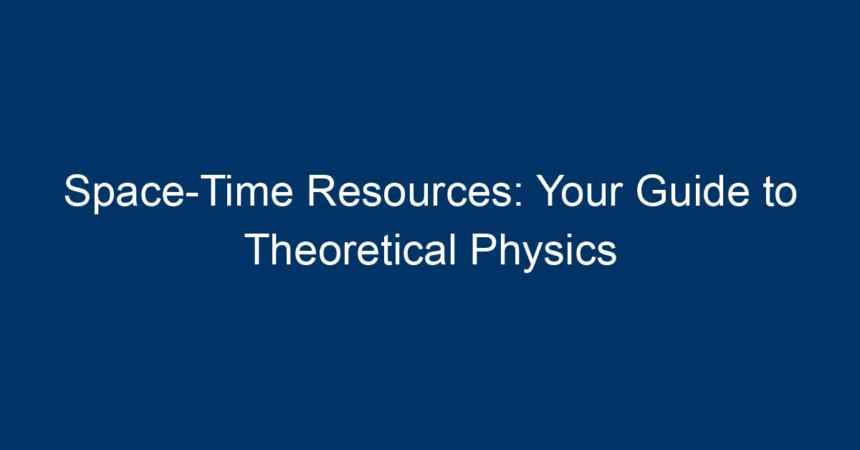The universe is a tapestry woven from the fundamental threads of physics, with space and time serving as the backdrop for all celestial events. For those curious about the intricate dance of galaxies, black holes, and cosmic phenomena, "space-time resources" form an invaluable compass. This article will guide you through the vast expanse of theoretical physics, enriching your understanding while providing accessible resources that cater to both enthusiasts and seasoned scholars.
Understanding Space-Time: Foundations of Theoretical Physics
Before delving into the extensive resources available, it’s crucial to grasp the fundamental concept of space-time. Proposed by Albert Einstein in his theory of relativity, space-time merges our three-dimensional understanding of space with the fourth dimension of time. This revolutionary idea transformed how we perceive the universe, revealing that gravity is not just a force but a curvature of space-time caused by mass.
The Basics of Relativity
Einstein’s special relativity principles explain how time can vary depending on speed, while general relativity expands on this by incorporating gravity. Here’s a simplified breakdown:
-
Special Relativity: Introduced in 1905, it states that the laws of physics are the same for all non-accelerating observers, and that the speed of light is constant.
- General Relativity: Published in 1915, this theory describes gravitational attraction as a warping of space-time caused by mass, fundamentally altering our understanding of gravitational forces.
Understanding these principles is crucial to exploring advanced theories in physics and navigating the broad field of space-time resources.
Essential Space-Time Resources for Beginners
Books
If you’re just starting out, several seminal texts can deepen your understanding:
-
“A Brief History of Time” by Stephen Hawking: This bestselling book delves into complex concepts in an accessible way, discussing black holes, the Big Bang, and the nature of time and space.
-
“The Elegant Universe” by Brian Greene: Greene introduces string theory and the quest for unifying the four fundamental forces of nature, explaining difficult ideas in a relatable manner.
- “Six Easy Pieces” by Richard Feynman: A compilation of lectures from the Nobel laureate, these pieces present foundational ideas in physics without overwhelming jargon.
Online Courses
Furthering your knowledge of space-time theory can also be accomplished through various online platforms:
-
Coursera: Offers courses like "Introduction to Einstein’s Theory of Relativity," enabling self-paced learning from prestigious universities.
-
edX: Provides access to courses on theoretical physics, with some focusing explicitly on relativity and gravity.
- Khan Academy: A fantastic resource for younger audiences or beginners, featuring free lessons in physics fundamentals.
Documentaries and Videos
Visual learning can illuminate complex topics. Consider these documentaries:
-
“The Universe” series: This History Channel series explores cosmic phenomena, featuring episodes on black holes and the fabric of space-time.
- YouTube Channels: Channels like PBS Space Time and Veritasium break down theories with engaging animations and clear explanations.
Advanced Space-Time Resources for Enthusiasts
Once you have the basics down, you may wish to explore more complex theories and detailed studies:
Research Papers and Journals
The world of theoretical physics is rich with current studies and historical papers:
-
arXiv.org: A repository of physics papers where you can find some of the latest research in quantum gravity, cosmology, and more.
- Physical Review Letters: A reputable journal that publishes short articles on significant advances in all areas of physics, including theories involving space-time.
Online Forums and Communities
Engaging in discussions with others passionate about physics can enhance your learning experience:
-
Physics Stack Exchange: A question-and-answer site for physicists where complex questions can be posed and answered by experts in the field.
- Reddit: Subreddits like r/Physics and r/TheoreticalPhysics allow users to discuss theories, recent discoveries, and share educational resources.
The Role of Space-Time in Modern Physics
As we navigate through the cosmos, space-time remains central to ongoing research and discovery. Contemporary scientists seek to unravel the mysteries of dark matter and dark energy—two phenomena that may hold keys to understanding the universe’s dynamics.
Quantum Gravity
One of the prominent areas of research in theoretical physics is understanding gravity through quantum mechanics. Efforts to combine these two fundamental fields, such as string theory and loop quantum gravity, aim to formulate a cohesive understanding of space-time at the quantum level.
-
String Theory: Proposes that the fundamental particles we observe are not point-like dots but rather tiny vibrating strings, potentially unifying all physical forces, including gravity.
- Loop Quantum Gravity: Attempts to merge general relativity with quantum mechanics while suggesting that space-time itself has a discrete structure composed of finite loops.
M-Theory and Beyond
M-theory is a proposed “theory of everything” that seeks to unify string theories. This advanced concept posits the existence of higher dimensions beyond our perceptible universe, expanding our comprehension of space-time resources and the fabric of reality.
Conclusion: Your Journey with Space-Time Resources
The exploration of space-time is an ever-evolving field that promises to unveil the universe’s mysteries. Whether you are a casual reader or a physics devotee, utilizing various space-time resources can enhance your understanding of theoretical physics.
Actionable Insights
-
Start with foundational books to develop a solid understanding of relativity.
-
Enroll in online courses for structured learning and engagement with experts.
-
Engage in communities and forums to share ideas and ask questions.
- Dive into advanced research papers to explore the latest advancements.
The universe beckons us to explore its wonders, and armed with the right knowledge and resources, you can embark on this exhilarating journey through space-time like never before. Embrace the adventure, and let curiosity be your guide!




